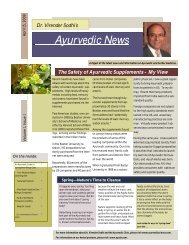A Tale of Three Trimesters - EditPro-Services
A Tale of Three Trimesters - EditPro-Services
A Tale of Three Trimesters - EditPro-Services
Create successful ePaper yourself
Turn your PDF publications into a flip-book with our unique Google optimized e-Paper software.
Morning (Noon and Night) Sickness: Are you feeling a little queasy?<br />
Unfortunately for many women, that feeling isn't limited to mornings.<br />
Most pregnant women with morning sickness feel slightly “sea sick” at<br />
other times <strong>of</strong> the day also. You may also notice that you are sensitive<br />
to certain smells. Not all pregnant women with morning sickness<br />
have vomiting. If you do, take special care to make sure you don’t<br />
become dehydrated. The good news about morning sickness is that it<br />
is usually limited to the first trimester.<br />
Sore and Enlarged Breasts: In early pregnancy, your breasts may be<br />
enlarged and tender to the touch because <strong>of</strong> the hormone surge your<br />
body is receiving. Once you get adjusted to the change, the<br />
tenderness should subside.<br />
Shaping up Your Diet<br />
Good nutrition before pregnancy is essential because <strong>of</strong> the resources<br />
pregnancy and childbirth will require. If your diet is poor now, you<br />
may be lacking in some <strong>of</strong> the key reserves you’ll need when the time<br />
comes to make a baby. Now is the time to improve your diet and build<br />
up your body’s immune system so it can sustain your baby and keep<br />
him healthy. Here are some <strong>of</strong> the key ingredients your pre-pregnancy<br />
diet should contain. You may want to consider supplements if you’re<br />
not getting enough <strong>of</strong> these in your regular diet.<br />
Folate: Also known as folic acid, this vitamin is critical for healthy<br />
development <strong>of</strong> the brain and spinal cord, which takes place early in<br />
pregnancy. Research studies have shown that women who get 400<br />
micrograms <strong>of</strong> folate daily before conception and during early<br />
pregnancy reduce their babies’ risk <strong>of</strong> neural tube defect (in which the<br />
brain and spinal cord are incompletely formed) by up to 70%. Good<br />
sources <strong>of</strong> folic acid are green leafy vegetables, citrus fruits, and<br />
enriched grains.<br />
Calcium: Your baby’s bones will need calcium to develop properly, and<br />
you need it to keep your own bones healthy. A physiological rule <strong>of</strong><br />
thumb during pregnancy is that your body will opt for supplying your<br />
12



